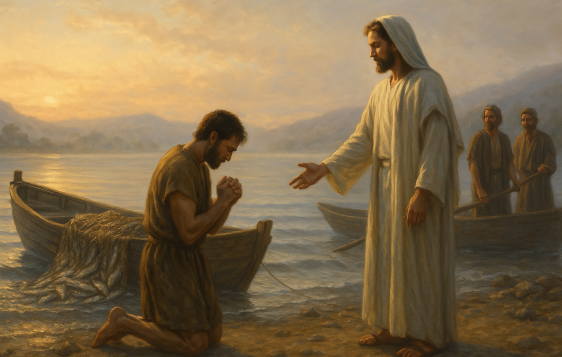Blog

When you have a fight with a loved one, do you tend to give them the silent treatment?
I remember growing up, my siblings and I would sometimes get into fights. We’d yell, wrestle, and sometimes even hit. After the confrontation was over, we’d usually storm to separate parts of the house to sulk and do our own thing. One of us would read or play a video game, another would sit in their room and play with toys for a while, one might go outside to shoot a few basketballs—we’d each find our own way to create space. Because even though the fight was over, we weren’t quite ready to go back to being pals yet.
Eventually, as some of the heat cooled off, one of us would find our way to the other’s location and start talking about something random. It was never a conversation about the argument. By then, the argument was water under the bridge. We found something to discuss that got us back on track, and by the end of the afternoon, we were good again.
It can feel that way with God if we don’t have a well-developed understanding of His grace. Because we are born with a predisposition to sin, and sin separates us from God, it can seem like there’s a barrier between us. We feel shame and guilt over our mistakes, and we think we don’t deserve to have fellowship with God. We aren’t the only ones. Even one of Jesus’ most famous followers started out that way.
Today’s passage in our journey through Luke (Luke 5:1–11) likely takes place chronologically before last week’s. There, we saw that Jesus was in the house of Simon, who would later be called Peter. He healed Simon’s mother-in-law of a sickness, as well as many others who were brought to Him. In this passage, a chapter later, we see Jesus call Simon for the first time. Simon recognizes his own sinfulness before Jesus’ power. Since Jesus healed Simon’s mother-in-law in the last section, it can be assumed that Simon had already seen Jesus’ power at work at that point, placing that event after this first meeting.
At the beginning of the chapter, we find Jesus on the shore of the lake of Gennesaret, which is more commonly known as the Sea of Galilee, where He was teaching the crowds. Eventually, the crowd pressed in closer, so Jesus got into a boat with a fisherman named Simon (and his brother, Andrew) and cast out away from the shore to teach from the boat. This allowed the water to carry His voice, amplifying it for the whole crowd to hear.
After Jesus finished teaching, He told Simon to go further into the lake and drop their nets to catch fish. Simon seemed exhausted and frustrated since they had been fishing all night and hadn’t caught a single thing. I’m sure you’ve heard—or lived—plenty of fishing stories that ended that way. But Simon recognized Jesus’ authority and respected it, so he cast out the nets anyway. In that moment, his obedience might have been reluctant, but it was the first time Simon had to act in faith. When the nets hit the water, they instantly began to fill with so many fish that they couldn’t haul them in alone. They called for help from their partners, James and John, and they managed to make it to shore. By the time they hit land, their nets began to break and their boats nearly sank from the number of fish.
This miracle caused Simon to recognize Jesus as Lord. He fell to his knees and asked Jesus to leave because he felt unworthy and sinful. Maybe Simon had habits or addictions he knew were wrong. Maybe it was his doubt just moments before that filled him with shame. Maybe it was a lifetime of small wrongdoings that he recognized had accumulated into a barrier between him and God. But rather than acknowledge Simon’s sin, Jesus instead told Simon to follow Him. He had a job for Simon: to catch men instead of fish. Simon, Andrew, James, and John all immediately followed Jesus once their boats were on land.
Like Simon, it is good to recognize how sinful we are before Him. We see similar recognitions of unworthiness and humility in other renowned figures in the Bible. There is an importance to acknowledging the vast span that separates the mortal from the divine. If not for His blood, we would stand before Him utterly impure and hopeless. But because of His finished work on the cross, He no longer sees that sinfulness. He sees a world of people He loves and is waiting to forgive. All who come to Him in faith, recognizing Him as their Savior, will be restored to an unbroken fellowship with God which can never again be severed. We never have to fear the silent treatment from God. We do not have to shuffle around awkwardly, waiting for Him to make the first move to reconcile our relationship. He already made the first move. Now, we get to respond to it with the joyful belief that Jesus defeated sin and death so we could be reconciled with God.
And we should also, like Simon, recognize Jesus’ authority in our lives even when what He guides us to do seems to not make sense. When we feel exhausted or frustrated, it should not stop us from recognizing that He has a purpose for us and that we should follow the path He has set out before us. Our obedience should be immediate, even when we don’t fully understand what He is doing.
Copyright © 2025 Lifeword.org. All rights reserved. No part of this article may be reproduced or reprinted without permission in writing from Lifeword.org

